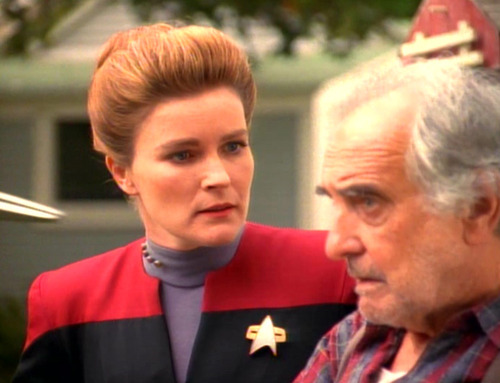Unit 3 of Star Trek: Inspiring Culture and Technology, asks us to consider Star Trek canon and some of the debates among fans as to what is and isn’t canon, and whether canon is even important.
In your opinion, what are the benefits of adhering to canon? What creative potential exists in jumping off from it? Where has Star Trek (or other similar franchises) done it well or poorly?
I think that feminist literary criticism has a lot to bring to this discussion. Basically when we’re talking about any canon – literary canon or Star Trek canon – we need to unpack how it was created, by whom, and in service of whose interests.
Calling something canonical is often seen as a measure of “greatness” (as in literature and philosophy), or more often in Trek fandom, as a measure of “authenticity” or alignment with Gene Roddenberry’s vision. It’s common to talk about canon status as if it is objectively determined, apolitical, and neutral in regards to race, gender, etc. Things that aren’t canon (e.g. fanfiction) are dismissed or even ridiculed.
But canon isn’t neutral or objective. In the case of Star Trek what’s canon consists of media created, produced and promoted mainly by white men – not unlike literary or philosophical canon.
Take a look here for the gender breakdowns of credited writers pre-Disco and here for the stats on directors. (Discovery has dramatically improved these numbers, as well as Trek’s score on the Bechdel-Wallace Test, but the show has also attracted a ton of canon compliance complaints.)
It’s worth taking a second to talk here about The Animated Series as well. In a 2007 interview D.C. Fontana said she didn’t see why TAS wasn’t “canon” other than that Gene Roddenberry didn’t like it: “I guess it isn’t ‘canon’ if I wrote it. Go figure.” Fontana and David Gerrold have both stated they considered TAS canon. So whose side do we land on? What are the pros and cons of categorizing TAS one way or another?
It’s extremely difficult to fully escape our own biases when we’re creating art. It’s impossible to do so when you aren’t even aware of those biases. When you analyze the content of the various Star Trek series and look at it side-by-side with behind-the-scenes examinations such as These Are The Voyages by Marc Cushman, and Inside Star Trek by Bob Justman and Herb Solow, it’s very clear that Star Trek’s creators held twentieth-century biases on issues of gender, race, sexual orientation and disability – even as they were writing a show about a supposedly egalitarian future. While each of the first five live-action series laid out progressive visions in a number of ways, each also had its cringe-worthy moments.
See this video for some important examples.
So when it comes to Star Trek canon I think the most important benefit is that by adhering to a set of established rules for the universe – from technologies like the transporter or replicator to the fact that Vulcans are shown as a logical society while Klingons are pugilistic and honour-driven – it lets fans watch across series and movies and instantly understand the basic principles. That means it’s not necessary for writers to explain these things over and over again in exposition.
However, as I outlined above, too strictly adhering to canon can limit the ability of Trek to embrace more diverse storylines and audience members. In her book Enterprising Women: Television Fandom and the Creation of Popular Myth, Camille Bacon-Smith interviews women who created early fanfiction, fan videos and filk music. Ninety percent of this fan creator community consisted of women, and as her research illuminates, much of the motivation was a sense that there was unexplored potential in these characters and settings. Given where Trek canon came from, it makes sense that men would be more motivated to defend or uphold canon, while women would be more likely to challenge parts of it.
As for me? I love the creativity behind fan works and I don’t mind at all if the Klingons suddenly change appearance or a series is set on a space station instead of a ship, or if a ship is propelled by mushrooms or Spock has a goatee. For me what makes Star Trek Star Trek are the core values: optimism, scientific curiosity, equality, critical thinking and diversity.











